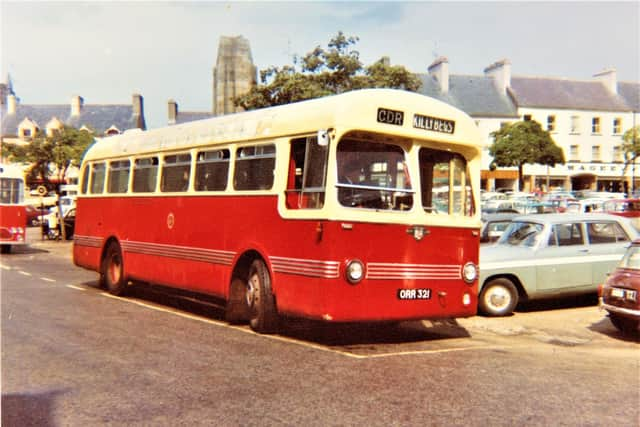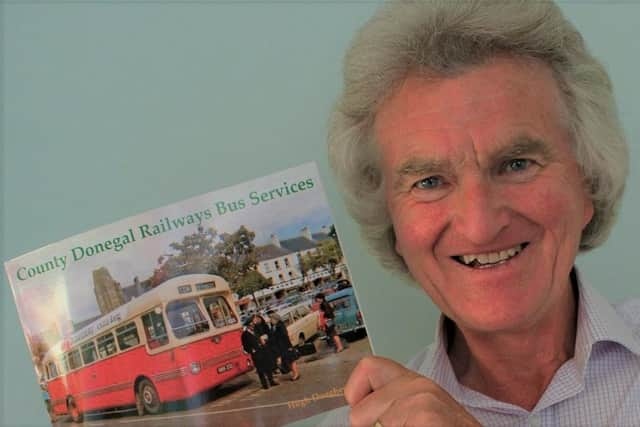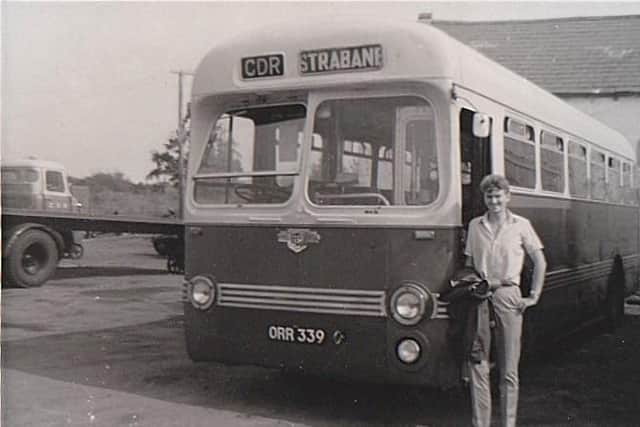Glasgow author's new book recalls the Donegal bus that thought it was still a railway
and live on Freeview channel 276
The CDR painted its replacement buses and road freight lorries in exactly the same eye-catching red-and-cream livery as its railcars and carriages, operated them over the same routes, and used the old station buildings as offices and garages.
The buses, which proudly carried the County Donegal Railways crest, ran almost to the same timetable as the trains they replaced, while CDR lorries took over from the goods trains. This a bus and lorry company which was sure that it was still a railway.
Advertisement
Hide AdAdvertisement
Hide AdSeventy-two year-old dad and grandfather, Hugh, whose family has close Donegal connections, spent his summer holidays in Glenties and Ballykillowen, as a teenager in the 1960s. He became fascinated by the railway buses, started photographing them, and got to know the crews, such as the Lafferty brothers, who had been railcar drivers, before going on the buses, as well as conductor Michael Boyle and the last, living CDR railcar driver driver, Michael Gallen, who died in 2019.


Michael drove the Strabane Letterkenny railcar before driving his CDR, later, CIE and Bus Eireann bus over the same route for 40 years, until he retired in 1988.
Said Hugh: “I was fascinated by the fact that the railway company was carrying on with its own buses and lorries, even thought its trains had gone, and, when I was 14 in 1965, I plucked up the courage to write to Mr Bernard Curran, the general manager in his magnificent station building offices at Stranorlar, to ask him about the new buses that the railway had bought from England.
" I was amazed to receive a reply and was delighted with the information that this busy man had taken the time to send on to me. I was more amazed, the day after I received the letter, when a neighbour in Glasgow, a Mr McLean, who came from Ballybofey told my mother, that he’d heard from his niece, Maureen McGilloway, Mr Curran’s secretary that a wee lad from Glasgow had been writing to the company. Glasgow and Donegal are like that, very closely interlinked, and in the years to come, on my visits to the head office at Stranorlar, I got to known Maureen well, and, like Danny, she always had plenty of interesting information about the CDR for me.”
Advertisement
Hide AdAdvertisement
Hide AdHugh decided to write the book to bring the story of the CDR up to date, as its days on narrow gauge rails have been well documented. He’s dedicated his new book to the late Danny Boyle, the last stationmaster at Glenties, and, when Hugh knew him, one of the clerks at Stranorlar CDR headquarters.


Danny was one of the first people in Donegal to recognise that the county’s railway heritage was disappearing, and made the company archives available to Hugh, and well as teaching him everything he knew about CDR trains and buses.
“After CIE took over the CDR in 1971, Danny worked on at Stranorlar, and, before he retired, he squirreled away lots of CDR items and artefacts to their new home in the Donegal Railway Room at St Connell’s Museum Glenties, which he helped to found,” said Hugh.
Hugh’s book, published by Stenlake Publishing, tells the story of the buses from the first service run by the railway in 1929, from Glenties Station to Rosbeg and Portnoo. It covers the years when the company’s bus routes were operated on the CDR’s behalf by Great Northern Railway of Ireland, whose blue-and-cream Gardner buses were a familiar sight on county roads, and known as the Joint Omnibus Services, to the closing of the railway, and the replacement services with the CDR’s own buses, as well as the joint routes, taken over from the GNR by CIE in 1958.
Advertisement
Hide AdAdvertisement
Hide Ad“The book tells the story of the crews, the routes, the passengers, staff efforts to fend off takeover by CIE, and jousting with the prying customs men at the border, who delighted in holding the buses up by making life difficult for passengers and crews alike, as they searched luggage for smuggled items. In the 60s, many emigrants left Donegal with a suitcase to head for Scotland, England or America, and many started their journey on a CDR bus, heading for the train to Belfast at Strabane, or the boat at Derry.


"The CDR was jointly owned by British Railways and the GNR, and it was amazing just how well-connected Donegal was then, with through fares and tickets available from stations in England, Scotland Wales to all places served by CDR buses in Donegal. And let’s not forget special buses taking Orangemen to Rossnowlagh for their annual walk, and the popular seaside excursions from Strabane, to Rossnowlagh and Bundoran, on summer Sundays. There’s a great story to tell, about the days before Donegal lost part of its transport independence when the CDR was taken over by CIE in 1971.”
On Saturday August 12, at 1.30 pm, as part of National Heritage Week, Hugh will be giving a talk about the CDR buses and his book at Donegal Railway Heritage Centre in Donegal Town. Royalties from the book are being donated to the centre to help it in its work of preserving Donegal railway artefacts.
*County Donegal Railways Bus Services by Hugh Dougherty is available from Stenlake Publishing Limited at £12.95 www.stenlake.co.uk from Donegal Railway Heritage Centre, www.donegalrailway.com and bookshops.